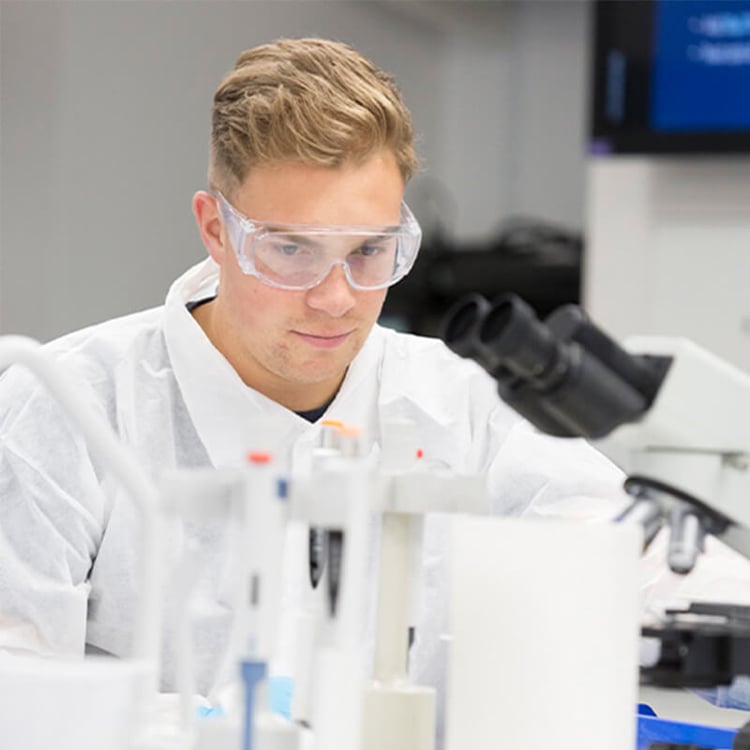/ Undergraduate /
Start date:
September 2025
Entry tariff:
112–128 UCAS points (or equivalent)
Foundation Year: 64–80 UCAS points (or equivalent)
UCAS Code: C120
C100 (if choosing Foundation Year)
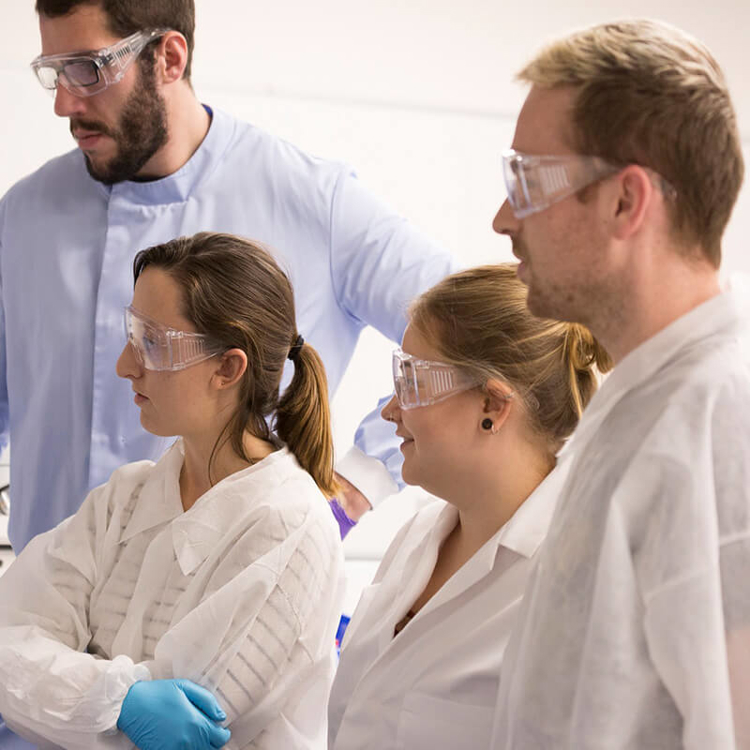
On-Campus Open Day
Saturday 12 July 2025
Study the world of living organisms whilst addressing pressing global issues such as climate change and infectious diseases. Get the specialist, practical skills you need to play a part in contributing to the health of our planet.
Did you know?
This programme aims to equip you with a comprehensive understanding of the biological sciences, emphazising the One Health approach that recognizes the interdependence of human, animal, and environmental health.
We offer learning beyond the classroom, including fieldtrips to Wales and South Africa. Read about one students experience here.
Top 3 modern university in London
(Complete University Guide 2025)

Ranked in the top 15% in the world
Times Higher Education Young University Rankings 2024

Ranked 3rd in the UK for Academic Support
National Student Survey 2024 for Biosciences

Foundation Year
This course can also be studied with a foundation year (September entry only).
Modules
This course offers all students the option of a one-year paid work placement, to boost your employability even further. If you choose this route, you will take the placement following year two of your course, and then return to complete your degree.
Why take a placement?
A placement year is the perfect opportunity to gain valuable work experience, to build on the career skills we will teach you on this degree. The connections you make on the placement will improve your career prospects further, and equip you with the skills you need to secure graduate-level employment.
How we support you
The University's Placement and Work Experience Team are experts at helping you to secure a placement. They will work closely with you from the start, helping you research potential employers, discover placement opportunities, create and pitch your CV, and will coach you to perform well in interviews. We aren't able to guarantee a placement, but our sector-leading advisors will give you the best possible chance of securing one.
Find out more about how we'll support you
We understand that your plans might change once you start your programme. If you decide not to do a placement, you will have the option of completing the three year version of your programme.
Whatever your choice, you will have access to many opportunities for work experience through our Placement and Work Experience Team, and access to face-to-face and 24/7 online careers support.
This course offers a foundation year, which takes place at the beginning of your studies. Studying a foundation year will give you academic and practical experience, and a strong introduction to your subject, ensuring you succeed on your undergraduate degree.
30 credits
You will develop your core academic and integrated English language skills of speaking, listening, reading and writing. You will become familiar with key academic skills and concepts, such as referencing methods and awareness of academic integrity and tone. You will apply these skills and knowledge to both broad topics and also your chosen subject pathway.
Teaching and learning
You will be required to actively engage in on-campus learning for up to 10 hours a week.
You will be taught through a full range of teaching and learning methods, which include lectures, seminars, workshops, discussion groups, group directed tasks and presentations. This will enable you to learn from your peers and tutors in both structured and information settings.
You will be encouraged to think creatively about your approach to learning and discussions with your peers. You will also have access to recordings, resources, links and signposting through Moodle to enrich your learning.
Assessment
You will be assessed through group and individual presentations, comparative and reflective essays, multiple choice exams, coursework and reports, oral exams, portfolios, case studies and blogs.
30 credits
You will develop your research, numeracy and information technology skills. You will investigate the difference between primary and secondary research, conduct your own research project and demonstrate your findings through data analysis. You will also develop your awareness of equality, diversion and inclusion in the UK, through a real-world issue; discrimination in the workplace.
Teaching and learning
You will be required to actively engage in on-campus learning for up to 10 hours a week.
You will be taught through a full range of teaching and learning methods, which include lectures, seminars, workshops, discussion groups, group directed tasks and presentations. This will enable you to learn from your peers and tutors in both structured and information settings.
You will be encouraged to think creatively about your approach to learning and discussions with your peers. You will also have access to recordings, resources, links and signposting through Moodle to enrich your learning.
Assessment
You will be assessed through group and individual presentations, comparative and reflective essays, multiple choice exams, coursework and reports, oral exams, portfolios, case studies and blogs.
30 credits
The module provides you with an essential introduction to the core principles and concepts that underpin biological sciences and offers you a multidisciplinary approach to understanding life at the molecular, cellular, and organismal levels.
You will examine how genetic, environmental, and socio-economic factors affect biological processes, with a focus on how certain groups may experience differing health risks or benefits. For example, you will study how genetic disorders, and metabolic diseases manifest differently across ethnic groups, and how access to healthcare or diagnostic tools can vary globally.
Throughout the module, case studies and discussions will emphasize the importance of inclusive practices in scientific research and healthcare, ensuring that biological studies and their applications reflect and serve the needs of all communities. Additionally, career-focused workshops will address the importance of diversity in STEM fields, providing you with a broader understanding of career opportunities and the role inclusivity plays in advancing biological sciences.
The module addresses sustainability through its focus on human health, environmental factors influencing biology, and the role of biological sciences in solving global challenges.
Topics such as metabolic processes, water balance, and body fluid composition can help you understand the body’s need for sustainable nutrition and hydration. Furthermore, by discussing diagnostics such as blood glucose testing and the effects of pollutants or chemicals (like endocrine disruptors in cosmetics), the course encourages you to think critically about sustainable practices in healthcare and their impact on individual and environmental health.
You will learn about genetic disorders and viral infections that affect populations worldwide, gaining insight into health issues across different regions. Case studies on health disparities and global diseases will be integrated into lessons to ensure you are aware of the worldwide scope of biological and medical science.
Teaching and learning
Through a combination of lectures, interactive seminars, laboratory sessions, and group projects, you will explore topics such as cellular structure and function, molecular biology, biochemistry, physiology, and homeostasis.
The module also gives you the opportunity to develop practical laboratory skills, critical thinking, and quantitative analysis, ensuring you are well-prepared for advanced study, research and undergraduate level.
The teaching delivery for each module consists of one, one-three-hour lecture and one, two-hour seminar per week. Lectures will cover core indicative content, while seminars will consist of research workshops, small group learning on relevant case studies and practical lab sessions.
You will also have an additional 30 minutes of online support each week, which will consist of formal preparation/review of lab sessions, or exam preparation (e.g. quizzes).
Assessment
This module will be assessed using an open book in-class test and a lab report and reflection.
50% - open book in-class test, consisting of 30 multiple choice questions.
50% - lab report and reflection, the report will include detailed analysis (quantitative and qualitative) of a chosen practical lab session, with an evaluative reflection of the practical limitations and implications of the undertaken research/experimentation.
30 credits
This module provides you with a comprehensive introduction to the principles of human health, the mechanisms underlying diseases, and the tools used to study them.
This interdisciplinary module integrates knowledge of physiology, pathophysiology, epidemiology, and biostatistics to equip you with a well-rounded understanding of the factors that influence human health and the burden of disease.
The module explores health disparities and inequities across global populations, emphasising how factors like ethnicity, socio-economic status, gender, and geography influence health outcomes. You will analyse worldwide health statistics, such as life expectancy, infant mortality rates, and access to healthcare, to understand systemic inequalities. Case studies will focus on specific healthcare challenges, such as the unequal burden of non-communicable diseases (NCDs) in low- and middle-income countries, or disparities in vaccination rates across regions.
Sustainability is embedded by exploring the role of health systems in promoting long-term wellbeing and reducing environmental impacts. Topics such as the rise of sustainable healthcare practices, including reducing medical waste and using renewable resources in healthcare delivery, will be discussed. You will also reflect on how public health policies can contribute to sustainable development goals by promoting preventative care and addressing environmental factors that affect human health.
Global engagement is incorporated through an examination of how diseases and health interventions are influenced by global factors such as pandemics, climate change, and globalisation.
You will analyse global health policies, including the role of organisations like the WHO in managing health crises, and investigate variations in disease prevalence and healthcare access across different countries. Comparative research tasks will help you appreciate the global nature of health challenges and solutions, such as those experienced during the COVID pandemic.
Teaching and learning
Through a blend of lectures, practical sessions, and research-focused activities, you will explore the key physiological systems that maintain homeostasis, the causes and mechanisms of diseases, and the role of public health interventions.
The module will also introduce you to fundamental research methodologies and statistical analysis, emphasizing the importance of data-driven decision-making in health sciences.
The teaching delivery for each module consists of one, one-three-hour lecture and one, two-hour seminar per week. Lectures will cover core indicative content, while seminars will consist of research workshops, small group learning on relevant case studies and practical lab sessions.
You will also have an additional 30 minutes of online support each week, which will consist of formal preparation/review of lab sessions, or exam preparation (e.g. quizzes).
Assessment
This module will be assessed using an infographic and a data analysis report.
50% - infographic, you will design an engaging and evidence-based infographic that communicates a key public health message to a target audience.
50% - data analysis report, you will be required to complete a structured data analysis report based on the analysis of a provided dataset related to a public health issue.
These modules are those we currently offer and may be subject to change.
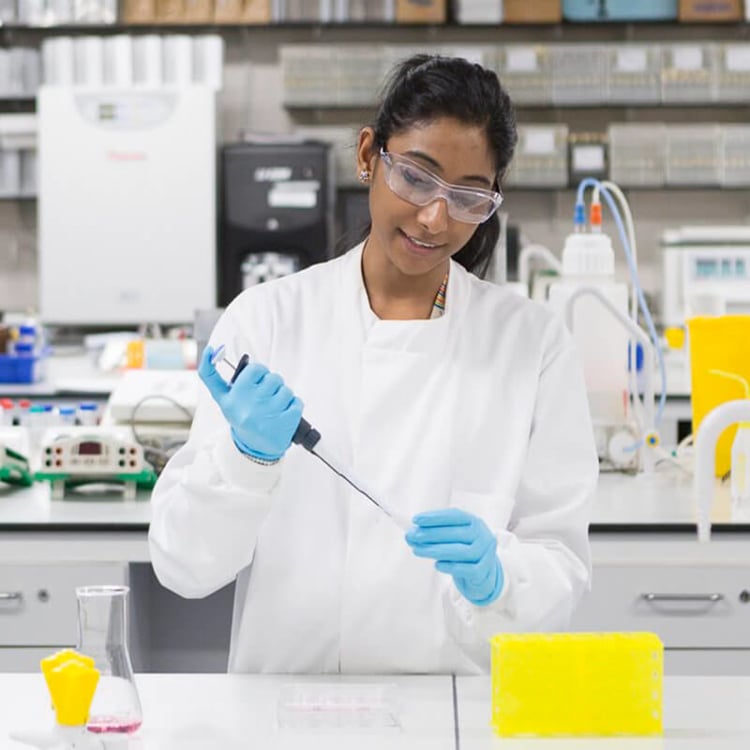
Skills
Unlock your potential as a future leader in the field of biological sciences.
Covering a range of biological disciplines, this course gives you the knowledge and skills to carve out a sustainable career in the health sector.
You will delve into the very essence of life and living organisms and will develop your skills and understanding across the biological disciplines, from core aspects of animal and plant biology to cutting edge developments within the fields of biotechnology, climate change, antimicrobial resistance and molecular ecology.
During your time with us, you’ll explore:
- Theoretical knowledge, practical skills, and critical thinking abilities in the field of biological sciences, equipping them you the tools to analyse complex biological systems and contribute to evidence-based solutions
- Cultivating a multidisciplinary mindset, enabling you to connect different disciplines and communicate effectively across scientific, policy, and public engagement domains
- Aspects of One Health: (Public Health (human), Comparative Zoology (animal) and Conservation Ecology (environment)
You will develop theoretical knowledge, practical laboratory skills (analytical and qualitative) and the ability to analyse complex biological sciences. Moreover, you’ll further develop the attributes you need to succeed in the workplace, including:
- Written and spoken communication
- Problem-solving
- Teamwork
- Critical thinking and analysis
- Leadership
- Attention to detail.
You’ll develop theoretical knowledge equipping you with tools to analyse complex biological systems and contribute to evidence-based solutions.
Each year, you will engage with a combination of generalist modules, such as Applied Biochemistry or Research Methods, and specialist modules that focus on different aspects of One Health, including Public Health (human), Comparative Zoology (animal), and Conservation Ecology (environment). This structure ensures that you develop a well-rounded understanding of the biological sciences while gaining specialized knowledge in specific areas related to One Health.
Your employability is our priority from day one. An optional paid work placement gives you the opportunity to gain professional experience between Years 2 and 3. When you graduate, you’ll have cultivated a multidisciplinary mindset, enabling you to communicate effectively across scientific, policy and public engagement domains.
Learning
Experience a dynamic, contemporary curriculum in state-of-the-art facilities.
Working in both small groups and individually, you’ll enjoy a mix of lectures and practical’s as you work through progressive modules, including:
- Cell Biology: delving into the structure, evolution and biochemistry of the cell.
- Diversity of Life: Understanding the tree of life, and covering key aspects of the evolution, anatomy, morphology, and physiology of major taxonomic groups.
- Introduction to Evolution: covering the history of the idea, the development and principles of evolution theory and an introduction to living
You’ll work in exceptional learning facilities, including:
- Laboratories equipped for DNA analysis, electrophysiology, microscopy, and more
- High-spec computer suites, supported by a team of expert laboratory and IT technicians.
You’ll learn core laboratory skills such as titration, pipetting, and how to design and carry out laboratory experiments such as addressing climate change or identifying biological or physiological traits of animals.
Your learning will go beyond the classroom. You'll participate in field trips where you will perform habitat surveys and mapping at the nearby Richmond Park & Wimbledon Common and travel to Wales to explore various UK habitats, including river ecosystems, salt marshes, and rocky shores. This week-long trip will provide you with the ideal experience for careers in habitat or conservation management, as you acquire field-based skills in ecology, animal behaviour, and animal physiology.
You will also visit local museums (e.g. the Natural History Museum and Grant museum of Zoology), Zoos (e.g. Chessington) and other local attractions (e.g. Kew Gardens and Wildfowl & Wetland Trust) to further your knowledge of animals and their interaction with humans and the environment.
An optional and student-funded module, Conservation, People and Wildlife: South African Field Course*, involves a two-week adventure to South Africa. You’ll learn directly from people living and working in conservation and related fields, and study South Africa’s wildlife including elephants, lions and rhinos. It’s a unique opportunity to get first-hand insight into the reality of conservation in Africa and gain valuable experience of another culture and country. Read about a students experience here.
*South African field trip is not included in tuition fee.
Throughout the course, you’ll be supported by a dedicated and passionate team of lecturers and sector professionals. Our learning is appropriately underpinned by research, scholarship and professional practice which reflects the entire scope of content in Zoology today from molecular techniques to societal challenges.
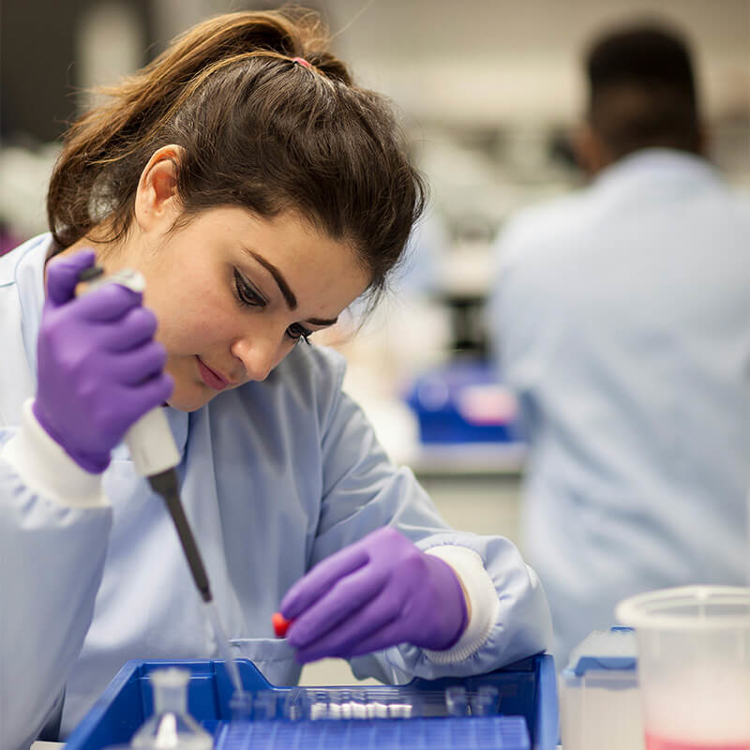
Assessment
Push yourself with real-world assignments.
Throughout the course, you’ll experience a wide range of assessments that enhance your understanding and practical skills, while giving you a taste of industry practices. These include:
- Online tests
- Multi-choice quizzes
- Written examinations
- Laboratory/fieldwork reports
- Presentations
- Essays
- Research and data collection projects
You’ll leave Roehampton with an in-depth understanding of both the theory and the hands-on applications of biosciences, ready to take the next step.
Careers
Shape the future of the world of living organisms.
Our graduates go on to work in different specialisms within the biological sciences, such as:
- Environmental Conservation
- Consultancy
- Public Health
- Epidemiology
- Veterinary Medicine
- Biomedical Research
- Policy Development
If you’re ready to learn, we’ll help you gain the confidence and opportunities to achieve.
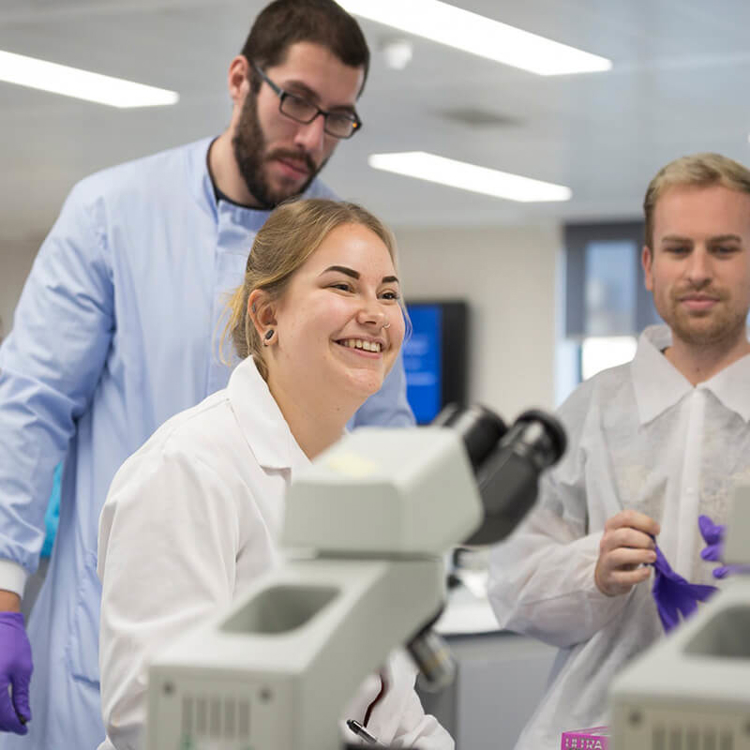
Many take on roles in the NHS and pharmaceutical industry. Others choose to explore a diverse range of roles, such as:
- Research Scientist
- Clinical Researcher
- Biotechnologist
- Environmental Scientist
- Science Communication and Education advisor
- Forensic Scientist
- Government or Regulatory Affairs
- Wildlife Biologist or Conservationist
- Quality Control Specialist.
The One Health approach equips you with the expertise to address pressing health concerns, promote sustainable practices, and contribute to the well-being of communities and ecosystems. This career-oriented focus ensures that graduates are equipped with the knowledge and skills necessary to excel in diverse and impactful roles within the field of biological sciences.
With our BSc Biological Sciences degree, you can also continue to postgraduate study – researching cancer and neurodegenerative disease or taking courses that prepare you for patient-facing healthcare professions.
Our careers team is available to support you from the start of your studies until after you graduate. We will help you build your CV, prepare for interviews, and meet and learn from successful graduates working at the top of their careers. You’ll also have opportunities to work with our partners across London and beyond, and to attend a Roehampton jobs fair where you can find out about graduate opportunities and meet employers.
Open days
Get a real taste of our campus, community and what it’s like to study at Roehampton
Applying
Full-time UK undergraduate students apply through UCAS.
Entry tariff
112–128 UCAS points (or equivalent)
Foundation Year: 64–80 UCAS points (or equivalent)
Looking to work out your UCAS points or find out about our entry requirements? Find out more.
When we consider applications to study with us, we form a complete view of your achievements to date, and future potential, and can offer flexibility in entry requirements. Find out more about our Contextual Offer scheme.
Specific entry requirements
A-level / BTEC (or equivalent qualification) required in Biology or Chemistry.
GCSE (or equivalent) requirement: Maths Grade C / 4.
Contact us for further information.
General entry requirements
September 2025 entry tuition fees
UK (home) tuition fees
Undergraduate degree: £9,535
Foundation Year: £9,535
We offer a wide range of scholarships and bursaries. See our financial support pages for UK students.
We also provide other ways to support the cost of living, including free buses and on-campus car parking, hardship support and some of the most affordable student accommodation and catering in London. Find out more about how we can support you.
International undergraduate students apply through our direct application system.
Entry tariff
112–128 UCAS points (or equivalent)
Foundation Year: 64–80 UCAS points (or equivalent)
Looking to work out your UCAS points or find out about our entry requirements? Find out more.
When we consider applications to study with us, we form a complete view of your achievements to date, and future potential, and can offer flexibility in entry requirements. Find out more about our Contextual Offer scheme.
Specific entry requirements
A-level / BTEC (or equivalent qualification) required in Biology or Chemistry.
GCSE (or equivalent) requirement: Maths Grade C / 4.
Contact us for further information.
General entry requirements
September 2025 entry tuition fees
EU and international tuition fees
Undergraduate degree: £16,950
Foundation Year: £16,950
International Foundation Pathway: £16,950
We offer a wide range of scholarships and bursaries. See our financial support pages for international students.
We also provide other ways to support the cost of living, including free buses and on-campus car parking, hardship support and some of the most affordable student accommodation and catering in London. Find out more about how we can support you.


